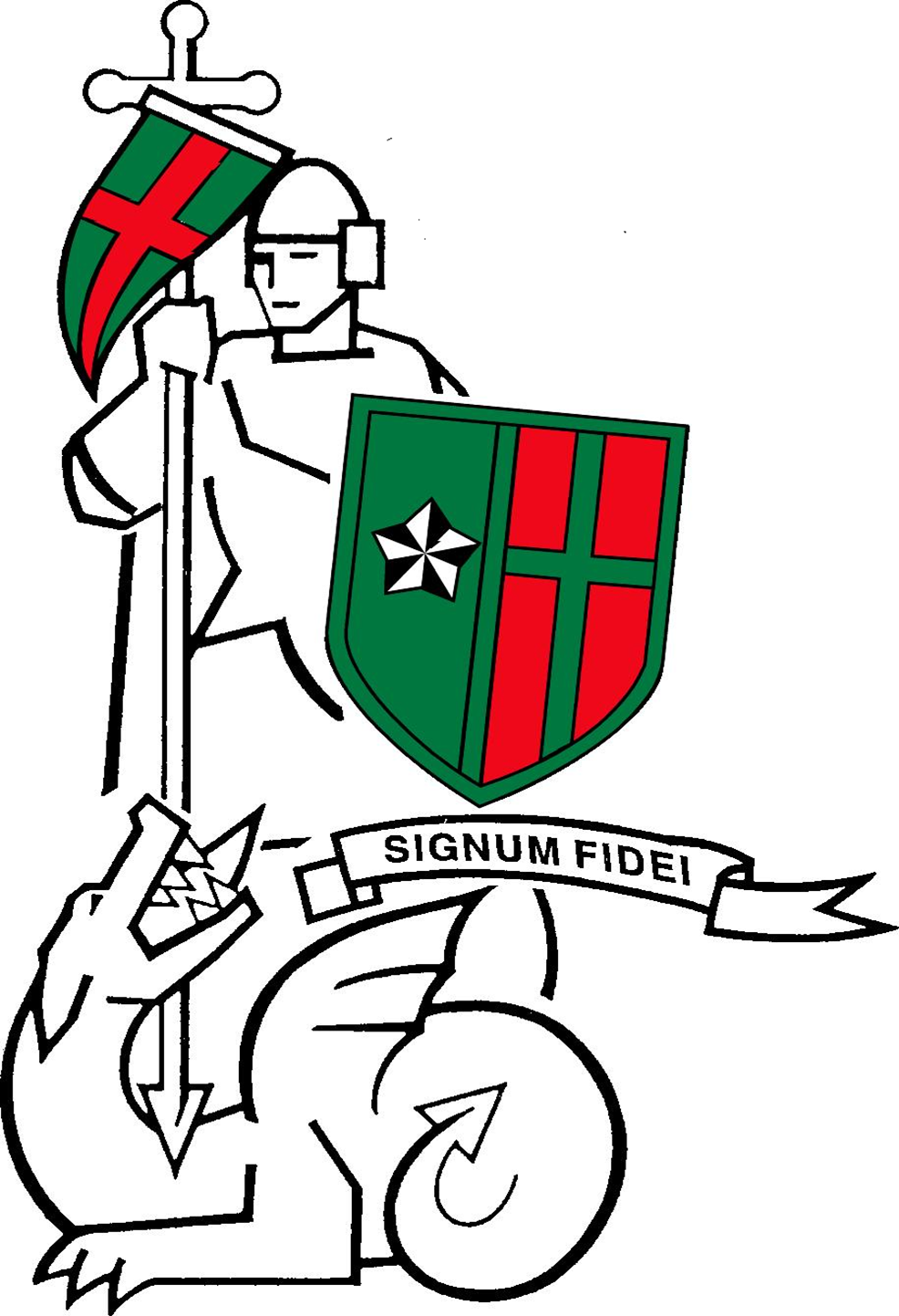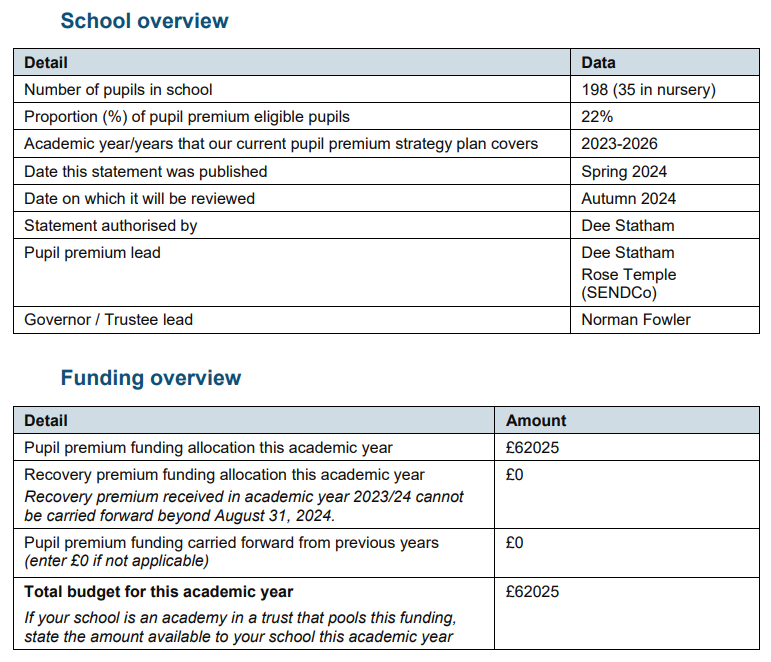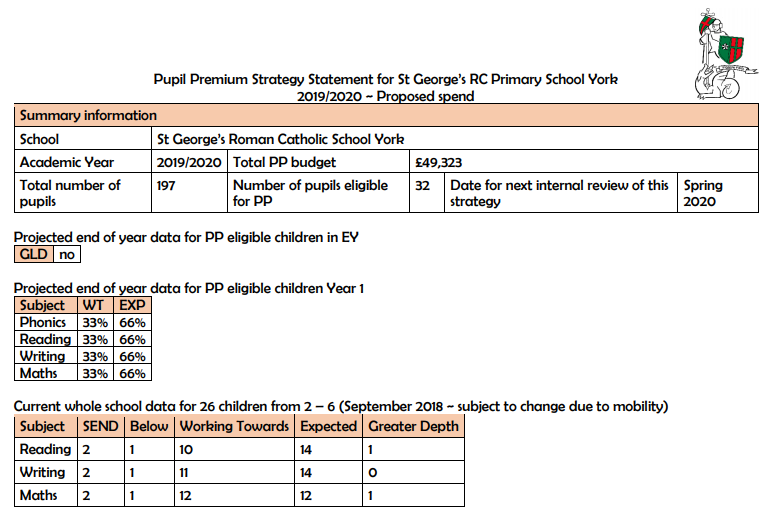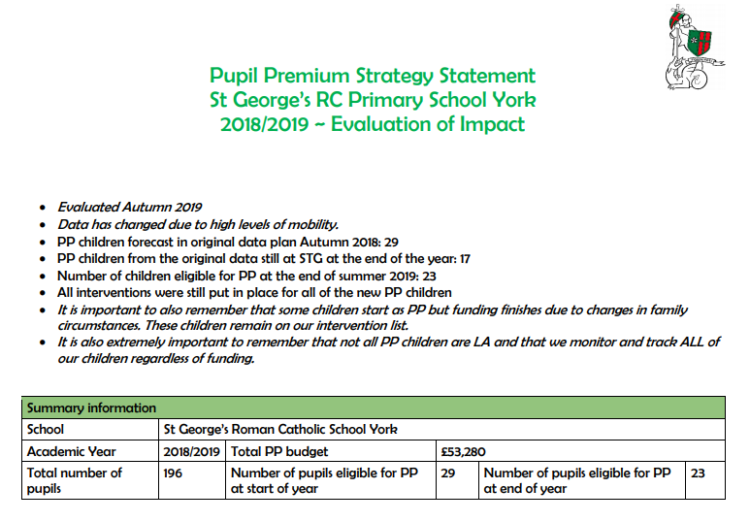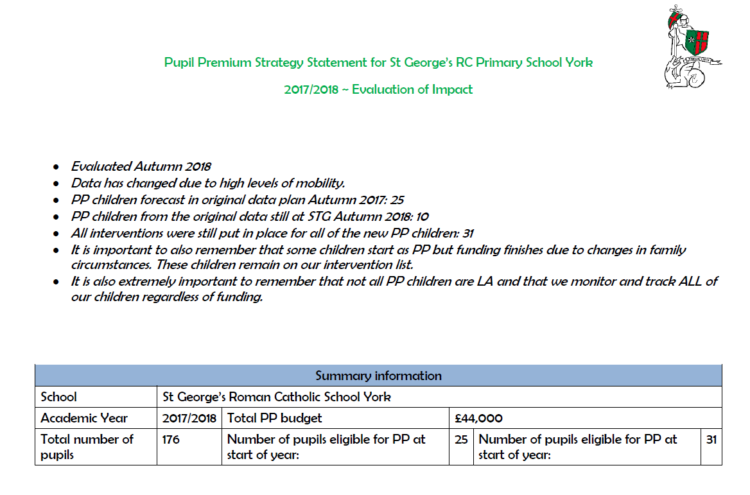The Pupil Premium (PP) funding is designed to ensure that funding to tackle disadvantage reaches the pupils who need it most. The funding is allocated to schools and is calculated on the number of pupils eligible for free school meals (FSM) at any point in the last six years, the number who are looked after or adopted and the number of service children. Pupil Premium funding is allocated to most effectively target additional support where it is needed most and schools decide how to spend this funding so that the attainment of these identified vulnerable groups can be best supported.. There is a nominated governor for pupil premium. The Pupil Premium Strategy is a working document that is reviewed internally at key points throughout the year, with an evaluation of impact over the complete year be published in the following Autumn term.
Pupil Premium Strategy 2023 – 2024
Pupil Premium Strategy 2022 – 2023
Pupil Premium Strategy 2021 – 2022
Pupil Premium Strategy 2020-21
Pupil Premium Strategy 2019-2020
Pupil Premium Strategy Statement for St 2019-20
Evaluated Pupil Premium Strategy 2018-2019
2018 – 2019 Pupil Premium Strategy Statement (EVALUATED)
Evaluated Pupil Premium Strategy 2017-2018
2017-2018 Pupil Premium Strategy Statement (EVALUATED)
Pupil Premium Strategy 2016-2017
The total amount allocated to St George’s RC Primary for the financial year 2016 to 2017 is £55,000.
The key barriers to future attainment for our children are:
1. Lack of wider opportunities for some of the PP eligible children
2. Poor attendance for some of the PP eligible children
3. Social and emotional issues affecting learning behaviours that support independent learning for some of our PP eligible children
How will we spend the funding to overcome the barriers?
1. To address lack of wider opportunities: We will fund music lessons for all of our PP children at St George’s RC School. We will fund 2 music teachers to come to school on a weekly basis to teach a choice of: guitar, piano, clarinet, flute, cello and violin. We will provide each child with a musical instrument of their own so that they can practice at home. We will organise and fund a music concert each term for ALL musicians in school so that the children have an additional incentive to practice and an opportunity to perform to an audience. We will enable children to have access to out of school funding to attend after school clubs that charge for participation and for trips & school journeys £500 FUNDING £10,670
2. To address poor attendance: We will fund a breakfast club every morning which will be run by one assistant teacher and one qualified ELSA. We will collect children from their homes, where necessary, and will fund the required car insurance, regulation booster seats and additional fuel for a designated ELSA’s vehicle. (We will also continue with our more traditional raising attendance initiatives such as working with families, SS and the attendance officer from CYC.) FUNDING £4,765
3. To support social and emotional issues: We will fund the training for 4 of our assistant teachers to become Emotional Literacy Support Assistants (ELSAs) to work with our children who are identified by class teachers (through our progress meetings) as having issues that are affecting their learning. Identified children will have access to a bespoke intervention run by one of our 7 ELSAs. There will be a pre and post assessment to measure impact.
In addition we will fund an intervention leader to work on a 1:1 or 1: group basis with any of our PP eligible children who require additional bespoke learning in READING and PHONICS £8,200.
FUNDING £10,682
We will also be funding a place on the year 6 residential trip £200.
Additional money to be spent on:
Targeted Teaching support including 1:1 interventions for PP eligible children
Increased SLT time to monitor attainment and progress for PP eligible children
£28,883
Total funding to be spent: £55,000
A few simple strategies will also be implemented such as the work books of the PP children will always be marked by teachers first and the PP children will always be discussed at the progress meetings first. This will ensure that the progress of our PP children is always at the top of our agendas.
How will we measure the impact of the funding?
We will use both internal and external data to measure the impact of the Pupil Premium Funding on our pupils’ learning. We will review the effectiveness of the interventions we are using and adapt them to meet need when and where required. During progress meetings we will look for evidence that:
1. Children approach and overcome challenges in a positive way. They choose and attempt challenging activities, with fewer supported interventions needed, as evidenced through learning walks and book scrutinies.
2. Attendance figures are raised and the families are more involved in school life. There is less reliance on the ELSAs to intervene in bringing the children to school. Children make good progress as evidenced through their books.
3. ELSA interventions have a positive impact on children’s well-being as evidenced in greater resilience or an increased ability to draw on internal strengths. This will have a positive impact on progress as evidenced in the books.
4. PP eligible children reach age related expectations, as a minimum, in writing, SPAG, maths and reading at the end of year group.
Impact
|
Aspect |
Impact |
|
1 |
Evidence from progress meetings and book scrutinies shows that the PP children are becoming more resilient and are choosing more challenging work. The wider ops initiative is giving children a greater sense of confidence and self-esteem. They are joining in with the life of the school a lot more and their parents are attending music festivals organised by school. Some of the families are the harder to reach families and the opportunity to involve them in the life of the school is having a very positive impact on the children’s progress. |
|
2 |
Families are much more involved in school life due to the wider ops initiative. The attendance for these children has been raised. The children who are collected from home by our ELSAs are making better progress in school due to their better attendance. |
|
3 |
ELSAs have completed wellbeing assessments on all of the children with a particular emphasis on the PP children. Those children still causing concern are working with the ELSAs on appropriate programmes ~ deployed and monitored by the SLT. Data shows that there are definite nurture issues for some of our PP children and work will continue with them. The data also clearly shows that some children have made positive progress in aspects of wellbeing. PP children’s books will continue to be marked first and evidence from book scrutinies is showing that in years 4,5 and 6 the PP children are making good progress. SEND children are tracked using PIVATS and have my support plans were necessary. Small steps in progress are measured and next steps identified. |
|
4 |
PP data READING SEND ~ 21.74% (5/23) Working towards ~ 47.83% (11/23) Age related expectations ~ 30.43% (7/23)
WRITING SEND ~ 30.43% (7/23) Working towards ~ 43.48% (10/23) Expected ~ 26.09% (6/23)
MATHS SEND ~ 13.04% (3/23) Working towards ~ 56.52% (13/23) Expected ~ 30.43% (7/23)
SPAG SEND ~ 13.04% (3/23) Below ~ 4.35% (1/23) Working towards ~ 56.52% (13/23) Expected ~ 21.74% (5/23) Greater depth ~ 4.35% (1/23) The PP children will continue to be monitored closely during progress meetings, book scrutinies and pupil voice. |
Pupil Premium Spending for 2015- 2016
| The use of funding is detailed below: Use of Pupil Premium | Cost | Impact |
| Additional Teaching in KS2 | £19,161 | Targetted support for identified children leading to higher attainment |
| Teaching Assistants | £23,668 | Additional support for identified children in KS1 leading to higher attainmentAdditional support for children in Foundation Stage to support language developmentLiaison time for shared planning with class teachers so that teaching assistants are clear about next steps in learning for identified pupils |
| Homework Club | £1,016 | Vulnerable pupils and families supported in home learning |
| Resources | £2,280 | Enrichment activities (den building, museum and theatre workshops) to provide motivating learning experiences |
| Leadership time for attendance management and pastoral support | £2,000 | Vulnerable pupils’ attendance monitored carefully and appropriate support accessed |
| Staff training | £990 | Staff skills are developed in promoting positive behaviour and language skills so that pupils’ attainment and engagement with learning is supported. |
| Nurture | £8,892 | Social and emotional aspects of learning addressed through targeted work with skilled staff |
| Lunch time support | £2,364 | Lunch time role to support identified children so that they enjoy lunch times and access afternoon learning opportunities more effectively |
| Progress meetings for vulnerable children | £900 | Strategies to support effective learning of vulnerable pupils planned and evaluated |
| Swimming and Educational Visits | £1,300 | Enriching learning activities enjoyed by pupils. |
| Individual Enrichment Support | £1,000 | Individual learning opportunities realized for Pupil premium children (after-school sports club attendance, personal interest reading books) |
| Total Spent: £ 63,671Budget in excess of funding: -£13,151 |
Pupil Premium Spending for 2014-2015
The Pupil Premium funding received by St George’s RC Primary School in 2014/15 was £54,400, based on 59 eligible pupils. The use of funding is detailed below:
| Use of Pupil Premium | Cost | Impact |
| Additional Teaching in KS2 | £19,100 | Targeted support for identified children leading to higher attainment |
| Teaching Assistants | £23, 300 | Additional support for identified children in KS1 leading to higher attainment Additional support for children in Foundation Stage to support language development Liaison time for shared planning with class teachers so that teaching assistants are clear about next steps in learning for identified pupils |
| Homework Club | £1,000 | Vulnerable pupils and families supported in home learning |
| Resources | £2,280 | Enrichment activities (den building, museum and theatre workshops) to provide motivating learning experiences |
| Leadership time for attendance management and pastoral support | £2,000 | Vulnerable pupils’ attendance monitored carefully and appropriate support accessed |
| Staff training | £990 | Staff skills in promoting positive play and behaviour, so that pupils’ attainment and engagement with learning is supported. |
| Nurture (HLTA/TA2) | £9,685 | Social and emotional aspects of learning addressed through targeted work with skilled staff |
| Lunch time behaviour support | £2,500 | Lunch time role to support identified children so that they enjoy lunch times and access afternoon learning opportunities more effectively |
| Progress meetings for vulnerable children | £810 | Strategies to support effective learning of vulnerable pupils planned and evaluated |
| Swimming and Educational Visits | £1,000 | Enriching learning activities enjoyed by pupils. |
| Individual Enrichment Support | £1,000 | Individual learning opportunities realized for Pupil premium children (music tuition, after-school club attendance, personal interest reading books) |
| Total Spent: £63,665Budget in excess of funding: £9,265 |
Pupil Premium Spending for 2013-14
The Pupil Premium funding received by St George’s RC Primary School in 2013/ 14 was £48,900, based on 63 eligible pupils. The use of funding is detailed below:
| Use of Pupil Premium | Cost | Impact |
| Additional Teaching in KS1 | £8,036 | Targeted support for identified children leading to higher attainment |
| Additional Teaching in KS2 | £11,400 | Targeted support for identified children leading to higher attainment |
| Teaching Assistants | £11,823 | Additional Teaching Assistant time for identified pupils to support their readiness to learn |
| Homework Club | £986 | Vulnerable pupils and families supported in home learning |
| Resources | £2,265 | Learning needs of individual pupils effectively resourced |
| Leadership time for attendance management and pastoral support | £1,900 | Vulnerable pupils’ attendance monitored carefully and appropriate support accessed |
| Staff training to develop effective relationships between families and agencies | £995 | Staff skills in promoting positive play and behaviour, peer mentoring and improving writing developed so that pupils’ attainment and engagement with learning is supported. |
| Nurture (HLTA/TA2) | £3,122/£2,010 | Social and emotional aspects of learning addressed through targeted work with skilled staff |
| Anti-Bullying Workshop | £500 | Improved understanding of the range of barriers to effective relationships and how they can be reduced or overcome |
| Lunch time staff development and support | £445 | New lunch time role to provide leadership and support for staff during lunch time |
| Progress meetings for vulnerable children | £810 | Strategies to support effective learning of vulnerable pupils planned and evaluated |
| Swimming and Educational Visits | £1,000 | Enriching learning activities enjoyed by pupils. |
| Christmas Plays performed in school by a professional company | £380 | Theatre experience enjoyed by pupils |
| Art/Drama Consultants working throughout school on St Patrick project | £2,000 | High quality teaching in the arts experienced by pupils as they learn about local culture and history. Pupils have opportunity to perform their work in the National Centre for Early Music. |
| Total Spent: £47,227Remaining: £1673 |
